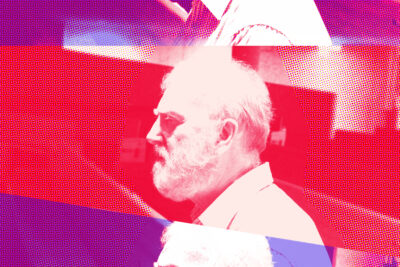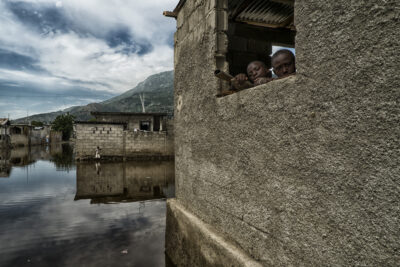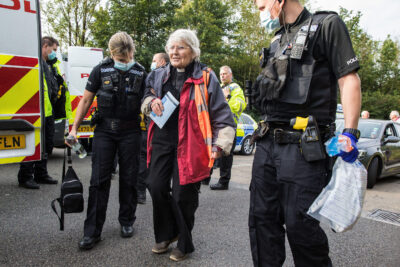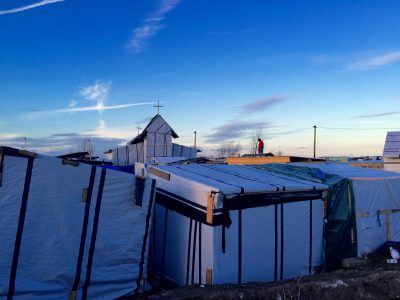“An actively policed border is always aggressive: it is where power suddenly acquires a body, if not a human face, and an ideology. One obvious ideology that concerns borders is nationalist: the border is there to divide one nation-state from another. But a more insidious ideology is centralist in practice: the belief that the centre of power can issue orders from a distance with impunity, and sacrifice the periphery; that what is out of mainstream sight is out of memory. And border zones are always periphery, always out of mainstream sight.”
Border, Kapka Kassabova
Tsolot
Sunday: a police clearance day. The guys must decamp early and cluster their tents on temporary ground, or risk detention and having all their possessions confiscated.
Diakon Aaron, a deacon in the Eritrean Orthodox church, greets me. He calls to the only other person up and about, Demsas, to come and help him clean their camp.
“We try to keep the place very clean. Gendar [gendarmes/police] respect us, and we respect them. They are not like CRS [French riot control].”
I pick up a few pieces of rubbish to help. “No, no, no,” remonstrates Diakon. “You big, we are small.”
“We are all big, all the same,” I offer as reply, but Diakon stubbornly refuses any offer of assistance. I walk beside him and he tells me of his friend in Sudan who has asked for asylum there but has twice been refused “because he is Christian.”
Yet another fence has been erected by the Calais authorities, this once transecting the public footpath, beside which the Eritreans camp. But there’s a gate through the fence; it is unlocked, and we reach the ‘fireplace’, the heart of the camp. The fire embers, sandwiched by two cracked breeze blocks, gently smoulder. The place is immaculately tidy. Beside the fire, a bundle of neatly tied leaf-clad branches: the broom. Diakon picks up a final two pieces of orange peel.
“What time is it?”
“8.15”
“Ok, we pray now.”
There are small numbers coming to Sunday tsolot (prayer) these days. Just half a dozen, plus the two Deacons. Shoes off, hats off, we stand on the green plastic tarp facing east and an already burning sun. Today is the feast of St Peter and St Paul. There are many Bible readings.

The background soundscape is a near continuous minor key moan, the leitmotif of lorries speeding northward to the port. Torello, Grunce, Discordia. Imperial Logistics. But most travel incognito: logo-less white or blue. A more discordant music punctuates: gull squawk, a magpie’s cackle, the clear-cut clarion of a woodpecker. Above, silent, the white line of a plane’s vapour trail. Everything around and above points to movement. But for these men, who have crossed continents and seas to get to Calais, movement has all but ceased.
There’s a momentary shift of attention as Diakon is speaking. A dart of the eye towards an arriving procession of vehicles. A white car, Police emblazoned on the side; two blue-black Gendarmes minibuses; a small truck; a white minibus; a blue car. They park parallel to where we are praying, some 20 metres away.
Everything around and above points to movement. But for these men, who have crossed continents and seas to get to Calais, movement has all but ceased.
A police woman disembarks from the lead car and starts taking photographs of us. Six armed and Covid-masked Gendarmes emerge from each of the blue-black minibuses. One detachment marches in crocodile file towards the Eritrean campsite. The second detachment stands guard beside the vehicles. The truck drives on to where the Eritreans have neatly piled their rubbish. Prayer continues; this is routine stuff, a ritual enacted every two days. A game, even; but always with darker intent.
Tsolot is ending. A ferry has arrived; the traffic flow reversed, now southbound – with eased Covid travel restrictions, cars, caravans, campervans. And always lorries. Diakon picks up a plastic flagon of water. Each of us in turn breathes across the open neck. He then blesses us with the water, a handful thrown at the face, a second rubbed into the head, and a final pouring into our cupped hands to drink.
Tsolot over, we walk back to the ‘fireplace’.
“I am cooking now,” says Diakon. “You must eat with us. I will make Shiro.”

Remembrance
The Eritrean camp in the ‘Jungle’: still unfamiliar ground. Bradon, visiting from America, and I approach gently, unassumingly, and are immediately invited to sit round the fire.
We learn from Zula, who I’ve met a few times previously, that his friend Mesfin has received the sad news of his father’s death back in Eritrea. I ask if we can go and pay our respects, and we are led to where Mesfin is seated: a circle of some twenty Eritreans. The two seats beside Mesfin are instantly vacated and we join the circle. He speaks a little English, and he tells me he is from Mendiferra. I throw in a few Tigrinya words and communication opens into the circle. There are smiles and laughter. We are brought orange juice, and then coffee. Dwarfing the many squat blue and green tents, a spacious orange one is a brightening backdrop to the bereavement gathering. It posits an incongruous holiday feel.
“When someone dies we gather and sit with the family, and talk and remember and laugh together. I think in Europe you don’t do that.”
A few days later I’m sheltering from the rain in Hagos’ tent, speaking to him about Mesfin and the death of his father.
“When someone dies we gather and sit with the family, and talk and remember and laugh together. I think in Europe you don’t do that.”
A week later, the ‘Jungle’ camp, ‘home’ to around a hundred Eritreans, has been destroyed by the authorities. Yet another fence will be erected. A relentless hostility towards the displaced person, towards the exile at the border. Zero tolerance.

Life, Death, and Birth
November 2019, a red candle burning in an orange tent, shrine to Gog Sain (God’s Will). A young Nigerian exile killed by the fumes from the makeshift heater he placed inside his tent in the hope it would warm him through the cold night. A week after his tragic death, the Calais authorities announced he would be buried at 4.00 pm the next day. His friends arrived at 3.30pm to participate in the important ritual of his burial only to find an already sealed grave. The authorities had come and gone. A heartless disregard. Zero tolerance.
July 2020. The wooden cross that marks his grave has already split. A rosary sways in the persistent Calais wind. On it a cross inscribed with the word Bethlehem. Bethlehem, another city at another border, walled and wired. A place of violent deaths. But perhaps the tinniest glimmer of hope here: Bethlehem, too, was a place of birth.
This article originally appeared in the Maria Skobstova House newsletter, Autumn 2020. It is reused here with permission.
Related Stories

To Illumine the Mind: the Catholic diaspora in Paris
In Paris, Martin Coffey leads a church overflowing with working class immigrants. The picture of religion in France, he tells us, is not what you think.
Mar 01 2024

Dust to Dust: Passionist Life in Haiti
In Port-au-Prince, Haiti, Fr Rick Frechette has been the cornerstone of a Passionist community all giving their lives for the beleaguered nation.
Oct 31 2023

Bodies on the Line: A Clarion for Christians
An exclusive extract from Rev'd Sue Parfitt's new book on Christians, Civil Resistance and the Climate Crisis - out soon via Lab/ora Press.
Jul 26 2023


